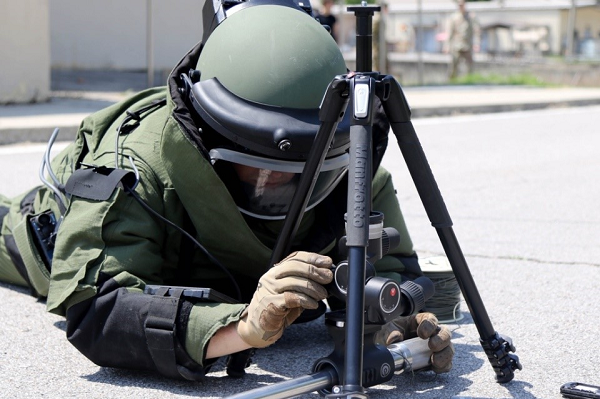Army Explosive Ordnance Disposal (EOD) Specialists (MOS 89D) are responsible for attacking, defeating, and exploiting unexploded ordnance.
These specialists are highly trained and perform a dangerous, technical job.
EOD Specialists are tactical and technical explosives experts, and is considered one of the most dangerous MOS in the Army.
Qualifications and Training
Soldiers who wish to enter into this MOS must volunteer for the position and be able to receive a Top Secret clearance.
Recruits must take the ASVAB test and receive a minimum score of 105 on the General Maintenance (GM) portion.
Soldiers will attend 10 weeks of Basic Combat Training.
After Basic Training, soldiers will attend 37 weeks of Advanced Individual Training (AIT).
AIT consists of two phases.
First, soldiers will receive basic EOD introduction and go through the bomb suit test.
Phase 1 is at Fort Lee, Virginia.
Soldiers must pass this test in the 70-pound suit in order to move onto phase 2.
Phase 2 will be at Eglin AFB, FL, and consists of hands-on training.
Soldiers are screened upon arrival to training and will be re-certified approximately every three years.
Skills that are helpful in this MOS include:
- Effective communication
- Ability to work under stress
- Ability to use computers
- Organized
- Interest in a job involving algebra, chemistry, trigonometry, geometry, and physics
- Critical thinking
Related Article –Explosive Ordnance Disposal (EOD) Technician: Career Details
What are the Job Tasks of an EOD Specialist?
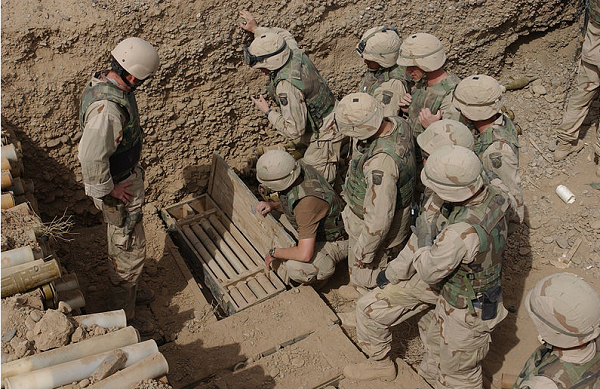
Explosive Ordnance Disposal Specialists work with unexploded ordnance, improvised explosive devices, and weapons of mass destruction.
These specialists support Army missions in any area around the world.
The main goal of an EOD specialist is to save lives and property from destruction.
These Specialists are required to be highly trained and qualified in order to work in this position.
Soldiers in this MOS are required to know:
- EOD terms and definitions
- Munition compositions
- Explosive effects
- Munition Identification
In a field setting, they can receive multiple calls, be required to effectively communicate with the person who spotted the target, and quickly locate/identify the ordnance.
The position is fast-paced and requires soldiers to work cohesively with team members.
When working in a field setting or responding to a call, the specialist will ensure the area is safe and work against the clock to complete their task before the ordnance fires or the possibility of an ambush.
EOD Specialists work with a variety of ordnance and weapon types.
They also work with both U.S. and foreign munitions.
Soldiers can work with ground ordnance, air ordnance, improvised explosive devices, biological/chemical weapons, and radiological/nuclear weapons.
When working with ground ordnance, soldiers will render safe and dispose of foreign projectiles, rockets, grenades or landmines.
Air ordnance requires soldiers to identify any aircraft hazards, properly remove hazards from aircraft, and work with items such as bombs or guided missiles.
Soldiers will disassemble device components of improvised explosive devices or IEDs.
When biological/chemical threats are possible, soldiers stress the importance of personal safety and decontamination when properly handling/disposing of the threat.
EOD specialists are required to understand different weapon designs and work to search, locate, and triage Radiological/nuclear threats.
Sometimes, these threats are in civilian areas and must be handled properly to avoid any threats to people or property around them.
They work with base electronics, arming systems, and firing systems.
These Specialists are required to destroy ammunition, explosives, and explosive devices.
This is done using special firing devices that allow destruction from a safe distance.
EOD Specialists conduct reconnaissance using the correct approach.
They will use different tools and equipment to complete reconnaissance as well as disposal.
One of these tools is the use of robotics.
These Specialists are required to prepare, maintain, and use advanced robotics in various aspects of their job.
The robotics come in different sizes, shapes, have different functions, and can be used to safely search for and disarm ordnance.
Technology that is similar to civilian gaming technology is used to control the robots.
On some robot controllers, the controller is very similar to that of an Xbox controller.
Other tools include ordnance locators and remote-control tools.
They are also required to prepare and maintain other tools, equipment, and any vehicles they use.
When identifying munitions, soldiers will refer to the EOD Publication System.
At times, EOD Specialists are required to assist the United States Secret Service in protecting the U.S. President, Vice President, or foreign dignitaries.
The Army video below provides more information on training and job functions of the EOD Specialist.
Related Article -Army Combat Medic Specialist (MOS 68W): Career Details
What Does an EOD Specialist get Paid?
An EOD Specialist will get paid based on rank and time of service.
As specialist complete training and rise in rank, so will their pay.
The Specialist can expect to be paid around $20,000 annually to start, with fluctuations during training.
Follow the table below to get an idea of Army base pay.
| Insignia | Pay Grade | Rank | Abbreviation | Minimum Monthly Pay |
|---|---|---|---|---|
| E-1 +4 months | Private | PVT | $1,917.60 | |
| E-2 | Private Second Class | PV2 | $2,149.20 | |
| E-3 | Private First Class | PFC | $2,259.90 | |
| E-4 | Specialist | SPC | $2,503.50 | |
| E-4 | Corporal | CPL | $2,503.50 | |
| E-5 | Sergeant | SGT | $2,730.30 | |
| E-6 | Staff Sergeant | SSG | $2,980.50 | |
| E-7 | Sergeant First Class | SFC | $3,445.80 | |
| E-8 | Master Sergeant | MSG | $4,957.20 | |
| E-8 | First Sergeant | 1SG | $4,957.20 | |
| E-9 | Sergeant Major | SGM | $6,055.50 | |
| E-9 | Command Sergeant Major | CSM | $6,055.50 | |
| E-9 | Sergeant Major of the Army | SMA | $6,055.50 |
Base pay does not include bonuses, special pay, or benefits.
Benefits
The Army provides bonus opportunities as well as special pay scenarios.
Currently, the EOD Specialist position is considered an in-demand position and has a $15,000 recruiting bonus for those who qualify.
In-demand positions change based on Army needs.
Benefits in addition to bonuses and special pay includes:
- Paid Housing
- Paid Food
- Tuition Assistance
- Annual Military Clothing Allowance
- Medical and Dental
- Paid sick time
- 30 days vacation a year
- Low-cost life insurance
Job Reviews
Reviews of the actual position are positive.
Most reviews discuss the position as being both mentally and physically challenging.
Positive reviews discuss the changing daily tasks and the team atmosphere.
Your safety in this position relies on you working with your teammates seamlessly.
Negative reviews discuss the impact that a leader can have on your experience.
The review below provides insight into an average day as an EOD specialist.
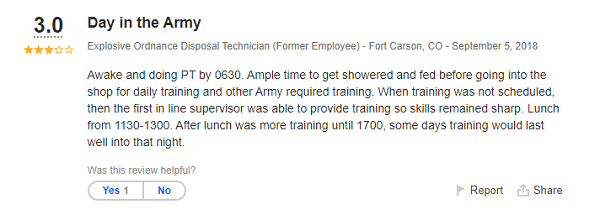
The reviews below provide more positive and negative aspects of the position.
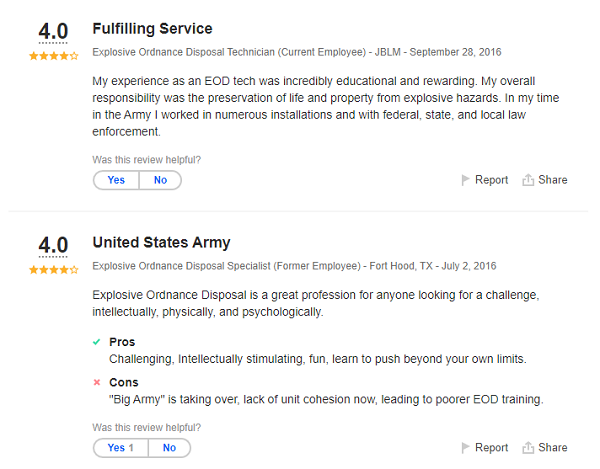
Related Article-12 Best Military Jobs By Branch
Civilian Career Opportunities
Working as an Explosive Ordnance Disposal Specialist allows soldiers to gain experience with explosives, electronics, hazardous materials, and safety regulations.
This job allows for soldiers to find civilian work with government agencies or private businesses.
Related civilian jobs include Ordnance Handling Experts, Hazardous Material Worker, Safety Specialist, Electronics Repairer, and Occupational Health Specialist.
Positions with civilian or government agencies as bomb-squad or tactical police teams are comparable to this position as well.
While in the Army, soldiers can work towards several different credentials that help with Army promotions and civilian career opportunities.
Some of the credentials that are found through the Army’s COOL program can be GI Bill funded and are nationally recognized credentials.
This program also qualifies for the PAYS recruiting program, which guarantees a job interview with a Military friendly civilian employer.
Summary
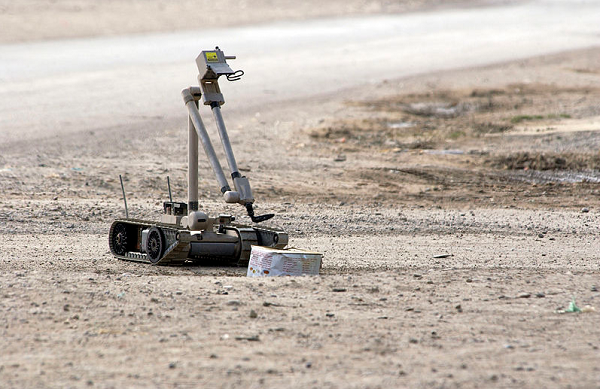
Army Explosive Ordnance Disposal (EOD) Specialists (MOS 89D) attack, defeat, and exploit unexploded ordnance.
The specialists in this MOS are highly trained soldiers who use advanced robotics and a variety of other tools to identify and dispose of hazardous ordnance.
Soldiers in this field go through a strict selection process.
They must meet Top Secret clearance, pass all ASVAB testing, and all portions of Advanced Training.
Previous EOD Specialists recommend the position because it allows them to think critically and perform under pressure.
This position follows Army base pay and soldiers are provided with benefits.
Once out of the military, soldiers can find civilian careers in safety, ordnance disposal, or electronics with private and government agencies.
Related Article-Army Medical Logistics Specialist (MOS 68J): Career Details
References
- 68 Series MOS: A List of Medical Field Jobs in the Army - June 19, 2024
- 15 Series MOS: US Army Aviation Jobs - June 19, 2024
- 11 General Orders For Each Military Branch - June 19, 2024
General FAQ
Is EOD Special Forces?
While Army EOD Specialists s may accompany and work with Special Forces from the Army or other branches, they are not classified as Special Forces.
How dangerous is Army EOD?
Army EOD may be the most dangerous job in the Army. EOD specialists are utilized year-round in multiple locations, often assistant civilian authorities defuse explosives around the globe.
How much does Army EOD get paid?
Army pay for an EOD specialist is based on rank and time in service. However, the Army offers pays them Demolition and Special Duty pay, and offers reenlistment bonuses up to $81,000 for this career field.
How long is Army EOD training?
After Basic, training to become an Army EOD (MOS 89D) is held in two phases: first, at Fort Lee, VA, secondly at Eglin AFB, FL, for a total of 37 weeks.
How do you qualify for Army EOD (MOS 89D)?
Army EOD is strictly a voluntary position. You must also obtain a Top Secret clearance and score 105 or better on the General Maintenance portion of the Armed Services Vocational Aptitude Battery (ASVAB).

